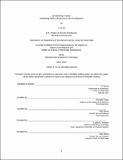| dc.contributor.advisor | Dutta, Arindam | |
| dc.contributor.advisor | Zheng, Siqi | |
| dc.contributor.author | Ha, Ji Ye | |
| dc.date.accessioned | 2022-08-29T16:23:41Z | |
| dc.date.available | 2022-08-29T16:23:41Z | |
| dc.date.issued | 2022-05 | |
| dc.date.submitted | 2022-06-16T20:08:27.326Z | |
| dc.identifier.uri | https://hdl.handle.net/1721.1/144959 | |
| dc.description.abstract | Hybrid working has now become the new normal. Besides working from home, there is an increasing demand for a space that is neither home nor the traditional office. While the home office has many benefits such as flexibility, work-like balance, and reduced transportation costs, employees still need a space that is detached from household chores and noise. Such demand is being met by various forms of working environment such as co-working office, dispersed office, satellite office and metaverse office. This societal demand for a new remote workspace is also happening in conjunction with digitization, rise of the metaverse, and the changing ways people engage with public infrastructure.
This project looks at Seoul, South Korea as an example of this societal shift, and finds opportunities in two types of public infrastructure: Post office and the welfare and administrative centers located at every administrative district in Seoul. With digitization, the number of post offices in Seoul is decreasing every year, and in some cases extra spaces are being leased to the private sector. With Seoul Metropolitan Government releasing a five-year plan to build in intricate metaverse platform, it is expected that more and more physical infrastructure within Seoul will be made available for alternative uses starting from year 2026 and beyond.
Matching societal demand for flexible remote working environment and a growing supply of public space for alternative use, this thesis explores ways of reappropriating portions of the existing public infrastructure in Seoul as remote work space. The proposed designs seek to provide public good that cater to the needs of the locals, at the same time creating a new revenue stream for the public sector. | |
| dc.publisher | Massachusetts Institute of Technology | |
| dc.rights | In Copyright - Educational Use Permitted | |
| dc.rights | Copyright retained by author(s) | |
| dc.rights.uri | https://rightsstatements.org/page/InC-EDU/1.0/ | |
| dc.title | Co-Working in Seoul: Integrating Public Infrastructure into the Metaverse | |
| dc.type | Thesis | |
| dc.description.degree | M.Arch. | |
| dc.description.degree | S.M. | |
| dc.contributor.department | Massachusetts Institute of Technology. Center for Real Estate. Program in Real Estate Development. | |
| dc.contributor.department | Massachusetts Institute of Technology. Department of Architecture | |
| mit.thesis.degree | Master | |
| thesis.degree.name | Master of Architecture | |
| thesis.degree.name | Master of Science in Real Estate Development | |
